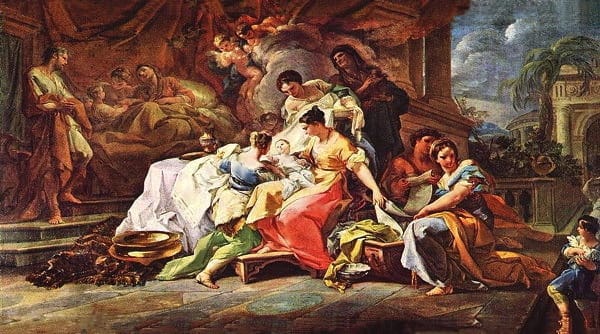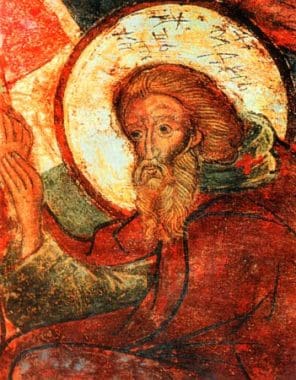On the Birth of Mary

From a discourse by Saint Andrew of Crete on the Birth of Mary
The old has passed away, all things are made new
The fulfillment of the law is Christ himself [cf Matthew 5:17], who does not so much lead us away from the letter as lift us up to its spirit. For the law’s consummation was this, that the very lawgiver accomplished his work and changed letter into spirit, summing everything up in himself and, though subject to the law, living by grace. He subordinated the law, yet harmoniously united grace with it, not confusing the distinctive characteristics of the one with the other, but effecting the transition in a way most fitting for God. He changed whatever was burdensome, servile and oppressive into what is light and liberating so that we should be enslaved no longer under the elemental spirits of the world [cf Colossians 2:8], as the Apostle says, nor held fast as bondservants under the letter of the law.
This is the highest, all-embracing benefit that Christ has bestowed on us. This is the revelation of the mystery, this is the emptying out of the divine nature, the union of God and man, and the deification of the manhood that was assumed. This radiant and manifest coming of God to men most certainly needed a joyful prelude to introduce the great gift of salvation to us. The present festival, the birth of the Mother of God, is the prelude, while the final act is the fore-ordained union of the Word with flesh. Today the Virgin is born, tended and formed and prepared for her role as Mother of God, who is the universal King of the ages.
Justly, then, do we celebrate this mystery since it signifies for us a double grace. We are led toward the truth, and we are led away from our condition of slavery to the letter of the law. How can this be? Darkness yields before the coming of the light, and grace exchanges legalism for freedom. But midway between the two stands today’s mystery, at the frontier where types and symbols give way to reality, and the old is replaced by the new.
Therefore, let all creation sing and dance and unite to make worthy contribution to the celebration of this day. Let there be one common festival for saints in heaven and men on earth. Let everything, mundane things and those above, join in festive celebration. Today this created world is raised to the dignity of a holy place for him who made all things. The creature is newly prepared to be a divine dwelling place for the Creator.
+
 St. Andrew of Crete, an early Father of the Church, was a theologian, hymnologist, and preacher, and lived between around 660 AD to around 720 or 740 AD. He did not speak until the age of 7, after receiving the Eucharist. At 15, he entered the monastery at Mar Saba (near Jerusalem) and is, thus, also known as St. Andrew of Jerusalem. He served the Church of the Holy Sepulchre there and was ordained a deacon at Hagia Sophia, the mother church of Eastern Christendom, in around 685 AD, was later ordained Bishop of Gortineia, Crete and eventually named an Archbishop there. He is honored as one of the great spiritual writers on repentance, and his “Great Canon” is still prayed during Lent in the Eastern Byzantine Churches.
St. Andrew of Crete, an early Father of the Church, was a theologian, hymnologist, and preacher, and lived between around 660 AD to around 720 or 740 AD. He did not speak until the age of 7, after receiving the Eucharist. At 15, he entered the monastery at Mar Saba (near Jerusalem) and is, thus, also known as St. Andrew of Jerusalem. He served the Church of the Holy Sepulchre there and was ordained a deacon at Hagia Sophia, the mother church of Eastern Christendom, in around 685 AD, was later ordained Bishop of Gortineia, Crete and eventually named an Archbishop there. He is honored as one of the great spiritual writers on repentance, and his “Great Canon” is still prayed during Lent in the Eastern Byzantine Churches.
+
The text for this post is from the Second Reading, Liturgy of the Hours, for September 8th.
+
Art for this post on the Birth of Mary: Geburt Mariä (Birth of Mary), Corrado Giaquinto, circa 1740-1750, PD-worldwide; Andrew of Crete, anonymous, 17th century, PD-US author’s life plus 70 years or less; both Wikimedia Commons.



